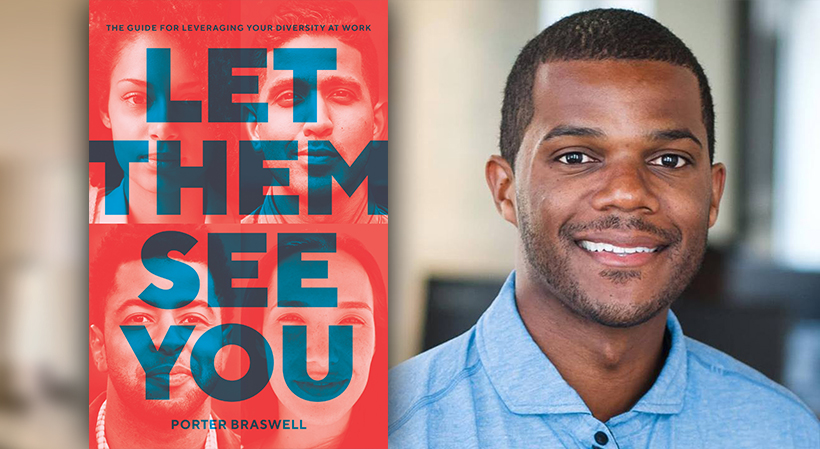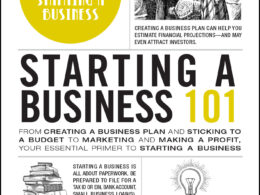The following is excerpted from “Let Them See You” Copyright © 2019 by Porter Braswell. Published by Lorena Jones Books, an imprint of Penguin Random House LLC.
Hard as it may be to believe, one of the world’s biggest and most ubiquitous personal brands actively resisted the notion that she was, in fact, a brand—for many, many years—until a chance encounter with a woman in a grocery store changed her mind. The fan, a mother, told her that it was her influence that had led the fan to stop hitting her child as a form of punishment. The personal brand is, of course, Oprah.
The billionaire media mogul told attendees at a 2015 QuickBooks Connect conference that once she had come to understand what branding was, she embraced it. For her, building a personal brand meant identifying key principles or values and sticking to them. It also meant being clear on one’s own intentions. Oprah became famous for requiring transparency from the guests on her talk show, and from herself. She wasn’t afraid to tell them when she had brought them on her show to satisfy a personal mission—for example, to shed light on domestic abuse by highlighting a victim’s story on-air with the victim’s family present.
You don’t need to build a vast media and lifestyle empire to have a personal brand. Anyone can develop one. What’s important is that you do, and once you do, that you act consistent with that brand. Here, we’ll examine just why personal branding is important and we’ll explore ways you can define your brand and nurture it to help you grow. Finally, we’ll discuss the importance of brand evolution.
But first, what exactly is a personal brand?
Related: 7 Expert Ways to Build an Unstoppable Personal Brand
Your personal brand
In 1997, business management author and speaker Tom Peters wrote in Fast Company:
“We are CEOs of our own companies: Me Inc. To be in business today, our most important job is to be head marketer for the brand called You.”
Thought to be the coiner of the term “personal branding,” Peters advocated for building a personal and professional reputation in much the same way the brand managers at companies like Nike or Starbucks went about building theirs. Trustworthiness, consistency, key differentiators—these were just as important in the individual as they were in giant brands. If you wanted to succeed in business, you’d start by marketing yourself.
Think of your personal brand as an amalgam of your public behavior, which you leverage as a representation of your values. It’s your reputation, sure, but it’s also all the things you do that define and differentiate you from others. It’s unique to you, and, to an extent, you nurture it by the actions you take and don’t take.
In some ways, Peters’s words foreshadowed the rise of the ultimate self-branding tool: social media. Thanks to Facebook, Twitter, Instagram, Snapchat and LinkedIn, we may be more cognizant than ever before of how we appear to the rest of the world. But if being aware of image is sharing a bunch of photos from a networking event, then building and maintaining a brand is curating a few choice photos of yourself with fellow movers-and-shakers, captioned with a key insight. In other words, there’s a right way and a wrong way to go about branding yourself.
Leveraging your brand online
There’s one major misstep many young professionals make when building a brand: inconsistency. Your personal brand isn’t just a costume you put on in the morning and take off when you get home. It’s a way of being. Everything you say and do at work, around members of your network, and online influences how you and your brand are perceived.
Let me repeat: Everything you do online influences how you and your brand are perceived. Your social media and forum posts, your texts, your emails—it all counts. Which means you can use your digital presence to help build your brand—or to tear it down.
Think about how closely a marketing team manages a company’s messaging. Marketers craft a brand’s social media calendar weeks ahead of time, and when a situation arises that demands a quick post, there is often an approval flow that social copy must move through before it hits the internet. For some brands, this approach has resulted in a well-crafted image that helps drive customer engagement.
Consider MoonPie, based in Chattanooga, Tennessee. The hundred-plus-year-old company has garnered a lot of social media attention for a Twitter account that is deeply rooted in millennial and Gen Z humor, makes intelligent use of well-known internet tropes, and never takes itself very seriously. In fact, MoonPie hired an agency to specifically handle social media, and in doing so, it has boosted sales and awareness for a brand that has otherwise changed little in the last century.
Conversely, those that ignore their online branding, even for a day, court disaster. For example, the dating app Tinder made headlines when it was cited as a contributing factor in the rise of hookup culture. When the journalist who wrote the article tweeted a particularly damning statistic—that 30 percent of Tinder users are married—the app’s social media account erupted, sending a barrage of angry tweets to the journalist and thereby drawing more attention to an already negative public relations situation. Other Twitter users piled on Tinder; journalists picked up the tweetstorm and generally mocked the brand; and, as of this writing, Tinder has yet to completely shed its image as a hookup facilitation app.
Sign Up: Receive the StartupNation newsletter!
I bring up these examples not to praise one brand or excoriate another but to demonstrate how brands that pour money into marketing and social media are affected by their online branding. The same is true for your personal brand. It’s not enough to put an opinion disclaimer in your Twitter bio. You need to be thoughtful about all your messaging and ensure that, at the very least, it’s always aligned with your traits. Beyond that, social media can be extremely useful for building and leveraging your brand. As you get ready to post that next photo or comment on someone’s story, ask yourself:
- Is this post consistent with the traits I have set for myself?
- Will this post move me closer to my brand goals or set me back?
- Am I engaging with others out of emotion, or do I really have something useful to contribute to the conversation?
- Am I engaging with the right individuals and organizations online?
- How can I be both visible and valuable within my online network? Can I help connect people or foster dynamic discussion?
- Am I demonstrating my expertise and skill set effectively?
- Do I need to scrub older posts that are not aligned with my branding strategy?
- How can I use social media to build a narrative, connecting my past accomplishments to my current engagements and future plans?
Let’s be honest—you won’t always use social media for brand building. But even if you’re not actively advancing your personal brand on your social platform of choice, your words will be perceived as part of it. It’s simple: if your personal brand is important to you, avoid whatever might erase the hard work you’ve put into creating it.
“Let Them See You” is available now at fine booksellers and can be purchased via StartupNation.com.






